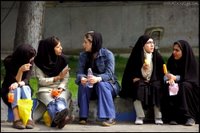Her approach is more confrontational and militant than the method I espouse, personally. But some of her writings are reflective of women right movements that are going on in Iran as well. In the spirit of fairness, it is imperative that I present another representative view of "Women in Iran".
My ideological difference with Namazi is on the question of veiling/unveiling.
in Unveiling the debate on secularism and rights she writes:
When it comes to the veiling of girls in schools, though, children's veiling must not only be banned in public institutions and schools but also in private schools and everywhere. Religious schools must also be banned. Here the issue extends beyond the principle of secularism and goes straight to the heart of children's rights. While adults may 'choose' veiling, children by their very nature cannot make such choices; what they do is really what their parents tell them to do. Even if there are children who say they like or choose to be veiled (as some media have reported), child veiling must still be banned - just as a child must be protected even if she 'chooses' to stay with her abusive parents rather than in state care, even if she 'chooses' to work to support her family in violation of child labour laws or even if she 'chooses' to stop attending school. States must intervene to protect children no matter what.
First, I do not believe in the legitimacy of state over personal rights and personal choices; in replacement of the tyranny of culture with the tyranny of state.
Second, I think to ban Hijab or to legislate Hijab is to give it political power. In Iran, during Reza Shah's modernization period, women were forced out of Hijab (this led to marginalization of all those hijabed women who played an important role in constitutional revolution), then 50 years later women were forced back into hijab (this led to marginalization of those who played an important role in all sectors of the public life.) And in both cases, "the right to dress" is galvanized into a political tool.

If banning hijab is, as Namazi suggests, to immunize the secular society to inflitration of fundamentalism, the history has shown that this ban is more likely to mobilize resistant forces that will polarize into fundamentalism.
picture from Ali Khaligh's photoblog
1 comment:
I didn't know Mrs. N. I had a looked at her website. Like you I don't relate much to her but she has some interesting positions. Thanks for introducing her and the photoblog.
Post a Comment